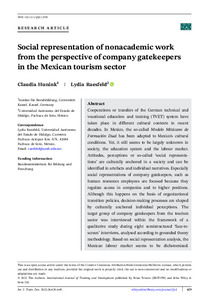| dc.date.accessioned | 2023-01-05T11:57:49Z | |
| dc.date.available | 2023-01-05T11:57:49Z | |
| dc.date.issued | 2022-11-22 | |
| dc.identifier | doi:10.17170/kobra-202301057319 | |
| dc.identifier.uri | http://hdl.handle.net/123456789/14339 | |
| dc.description.sponsorship | Gefördert im Rahmen des Projekts DEAL | |
| dc.language.iso | eng | |
| dc.rights | Attribution-NonCommercial-NoDerivatives 4.0 International | * |
| dc.rights.uri | http://creativecommons.org/licenses/by-nc-nd/4.0/ | * |
| dc.subject.ddc | 370 | |
| dc.title | Social representation of nonacademic work from the perspective of company gatekeepers in the Mexican tourism sector | eng |
| dc.type | Aufsatz | |
| dcterms.abstract | Cooperations or transfers of the German technical and vocational education and training (TVET) system have taken place in different cultural contexts in recent decades. In Mexico, the so-called Modelo Méxicano de Formación Dual has been adapted to Mexico's cultural conditions. Yet, it still seems to be largely unknown in society, the education system and the labour market. Attitudes, perceptions or so-called ‘social representations’ are culturally anchored in a society and can be identified in artefacts and individual narratives. Especially social representations of company gatekeepers, such as human resources employees are focused because they regulate access in companies and to higher positions. Although this happens on the basis of organizational transition policies, decision-making processes are shaped by culturally anchored individual perceptions. The target group of company gatekeepers from the tourism sector was interviewed within the framework of a qualitative study during eight semistructured ‘face-to-screen’ interviews, analysed according to grounded theory methodology. Based on social representation analysis, the Mexican labour market seems to be dichotomized. Academic titles have a high symbolic value, promising prestige. TVET options are given little focus, lack a high social esteem and are still largely unknown. Those produce técnicos, while holders of oficos often do on-the-job training within their families. Both depend upon their employers and have to accept unfavourable working conditions. This implies physically demanding, often gender-specific work. Promotions are possible, even without academic degrees. Because of a lack of institutionalization, these are subjective, depending on the goodwill of company gatekeepers. Promotions are possible to a certain extent, so nonacademic workers are facing a glass ceiling. | eng |
| dcterms.accessRights | open access | |
| dcterms.creator | Hunink, Claudia | |
| dcterms.creator | Raesfeld, Lydia | |
| dc.relation.doi | doi:10.1111/ijtd.12291 | |
| dc.subject.swd | Mexiko | ger |
| dc.subject.swd | Deutschland | ger |
| dc.subject.swd | OECD | ger |
| dc.subject.swd | Deutsche Gesellschaft für Internationale Zusammenarbeit. Sektorvorhaben Berufliche Bildung | ger |
| dc.subject.swd | Bildungssystem | ger |
| dc.subject.swd | Tourismus | ger |
| dc.subject.swd | Soziale Wahrnehmung | ger |
| dc.type.version | publishedVersion | |
| dcterms.source.identifier | eissn:1468-2419 | |
| dcterms.source.issue | Issue 4 | |
| dcterms.source.journal | International Journal of Training and Development | eng |
| dcterms.source.pageinfo | 629-645 | |
| dcterms.source.volume | Volume 26 | |
| kup.iskup | false | |


